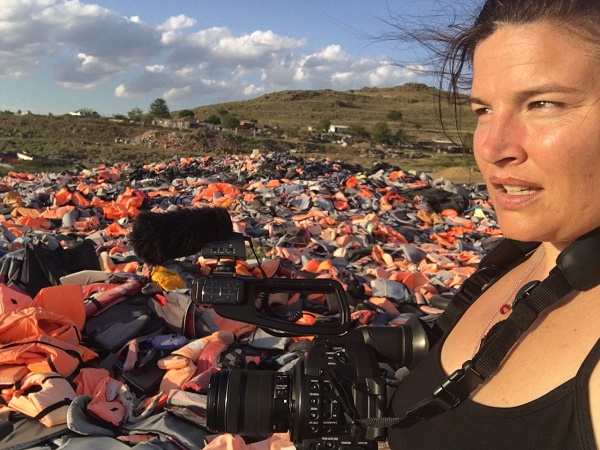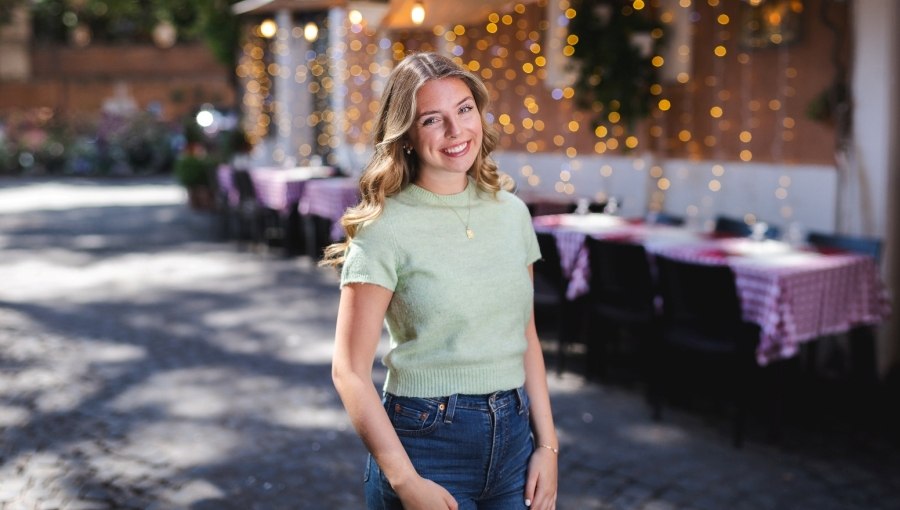So Fare Films: Professor Jenn Lindsay's Company Supports Emerging Filmmakers
Co-founded by Communications Professor Jenn Lindsay, So Fare Films is a documentary film production company and film training program in Rome, Italy. Since 2017, this female-founded independent film company has produced films that have been screened in festivals, conferences, and nonprofits worldwide. The mission of So Fare Films is to produce documentary films on social issues about human relationships, and to help emerging filmmakers hone their craft and expand their portfolios.
In the Spring 2020 semester, Professor Lindsay, who is also So Fare Films’ Producing Director, took on five assistant editors from JCU’s Communications students and alumni. The assistant editors’ task was to help draw two of So Fare Films’ main projects forward, namely, the documentary feature film Simulating Religious Violence (2021), where a group of computer scientists creates simulations to predict and prevent religious radicalization and violence, and the 8-episode docuseries The MRP Series (2022), where experts from different fields collaborate to build a new technology that explains religion.
So Fare Films has also been asked to take part in the JCU Learn Do Share program, an initiative that brings real companies and real problems into the classroom, increasing students’ participation in the company.

Professor Jenn Lindsay in Lesvos, Greece, at the “life jacket graveyard.”
Tell us about the process of setting up a production company. What were the main stages and what challenges did you encounter?
In the independent film business, whenever you are the producer-director of a film, you essentially form a production company. Every individual film has its own legal status, budget, business plan, and marketing strategy. The more movies you make, the more your experience base and “product line” expand, and it makes sense to start thinking in terms of building a platform for all of your projects, including the future ones, rather than concentrating on each individual project and repeating those efforts anew every time. A decisive moment for the company was the transition from thinking project-to-project into thinking more broadly about building the foundation for multiple works.
The establishment of So Fare Films has been a gradual process dating from my first homegrown documentary film in 2009. And now, more than 10 years later, we have quite a few projects under our belt and a much clearer idea of our identity as a company and our daily operations as a production house and training program. Lately, we’ve been working hard on our branding efforts and our strategic vision and attending to legal and structural issues that are part of running a company.
Why did you choose documentary filmmaking as your genre?
My venture into documentary film started as a way to collect raw material to edit with, since, when I first picked up a camera, I had neither enough money nor a crew to produce a scripted scene. But there was something astounding about capturing the briefest sublime moments, meaningful mundanities—a dog chasing a ball, a monk meditating, a man lost in thought, a praise group worshipping—and juxtaposing these images to show something truthful about human life. Later, when I started thinking more carefully about story structure and character development, I began to think more about the potential of documentary film to bring people into new worlds, new communities, new worldviews. I started studying documentary’s potential as a social change agent. And through my job teaching documentary filmmaking, I am able to relive vicariously this series of discoveries through my students.
Would you like to take this opportunity to introduce some of So Fare Films best work?
I’m very proud to say that our oeuvre is definitely getting stronger and more interesting as we move along. We have a number of projects in development, production, post-production, and pre-release, and also one currently circulating in the film festival market. From Quarantined Faith (2020) which captures the challenges of religious people in Rome as they try to organize their biggest holidays – Easter, Ramadan, and Passover – during the pandemic lockdown to Minding Shadows (2020), a feature documentary about an African Buddhist monk who braves a series of profound tragedies and rises to overcome them and help others, to ShalOM (2020) a film that chronicles the dialogue between the spiritual leaders of India and Israel.
Which filmmakers are most inspirational to So Fare Films, if any?
I try to watch as much as I can, to get ideas and new information and of course for entertainment. People on the team have different tastes and different exposure to materials, which makes all of our sensibilities a little bit different and creates an interesting conversation. If I had to choose my two favorite filmmakers I would say Wes Anderson and Werner Herzog.
What can we expect from SFF in the future?
We’re at the beginning of a huge re-branding effort to get some very important initiatives off the ground. Our Emerging Creators Network, which brings together early-career artists to work on projects, both ours and their own; and the Supported Projects slate, which helps launch and promote completed works that we think deserve a wider audience. Both of these initiatives are really just getting started, so my prediction/hope for the future is to see these programs become well-organized, well-populated, productive, and thriving.
How are JCU students contributing to So Fare Films?
In Spring 2021 So Fare Films doubled the post-production team when a handful of recent JCU graduates joined the company. In the same year, I taught a semester-long course on the Independent Film Business and worked on supporting current projects and expanding educational offerings.
Anything else you’d like to add?
I’m really grateful to be connected with John Cabot University because there are so many cool resources for a company like this. Between the raw talent in the Communications department, and the strong practical visions found in the Business and Marketing departments, there is a lot of muscle for launching a cutting-edge, productive, socially relevant arts company. This also provides a chance for the students to apply their education on a professional level, and a chance for So Fare Films to enrich the work we put out with a range of new perspectives and skill sets.
I’d like to encourage students to get in contact with us if they’re interested in bringing their skills to our team; it’s a unique and useful opportunity and we welcome anyone with a desire to contribute!





